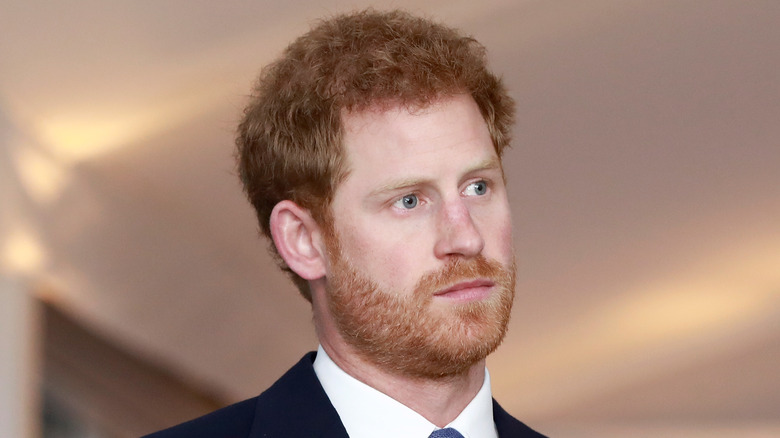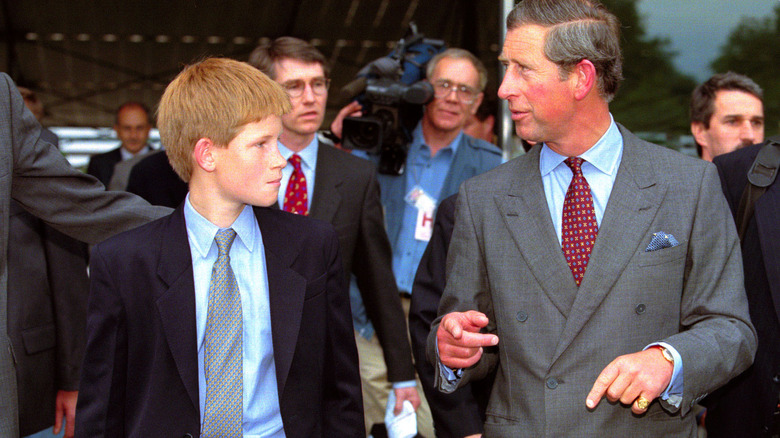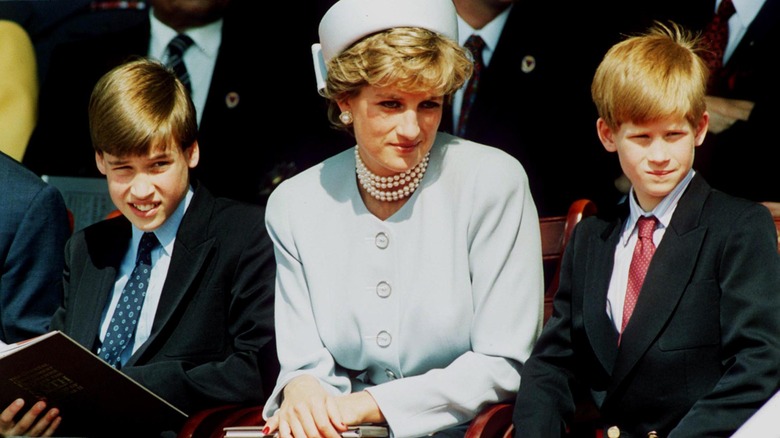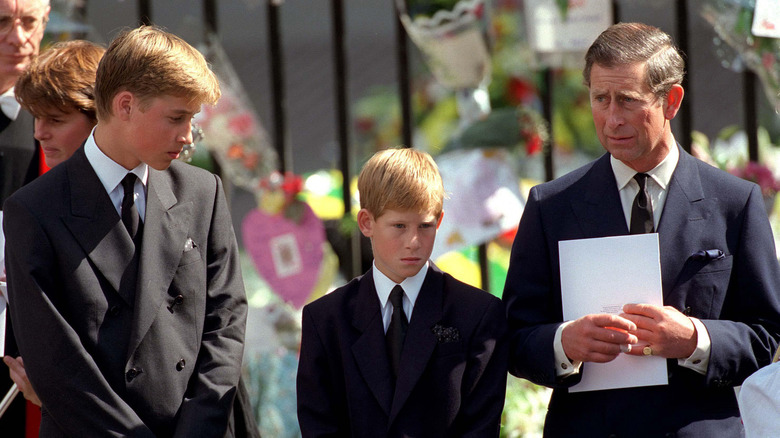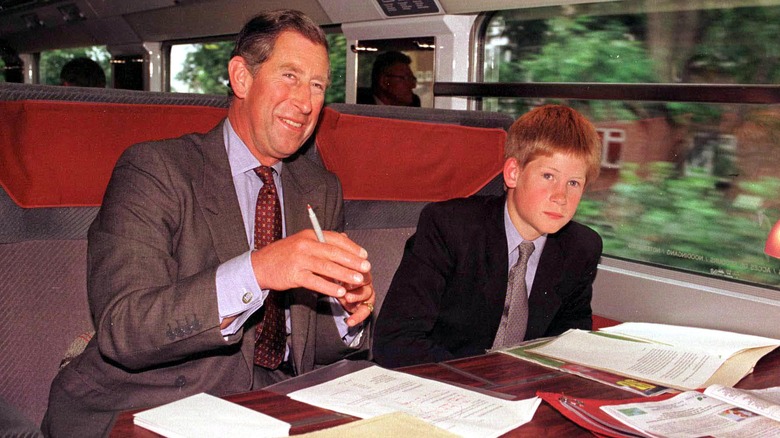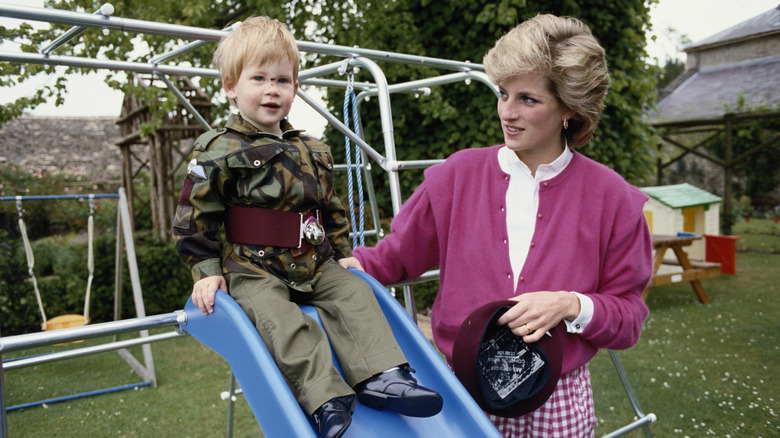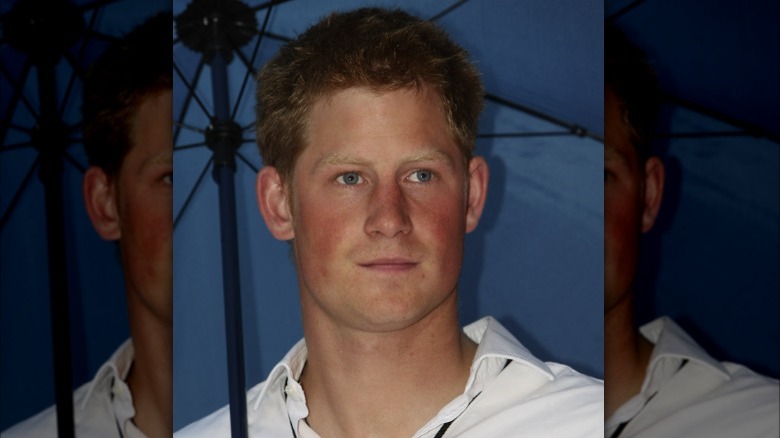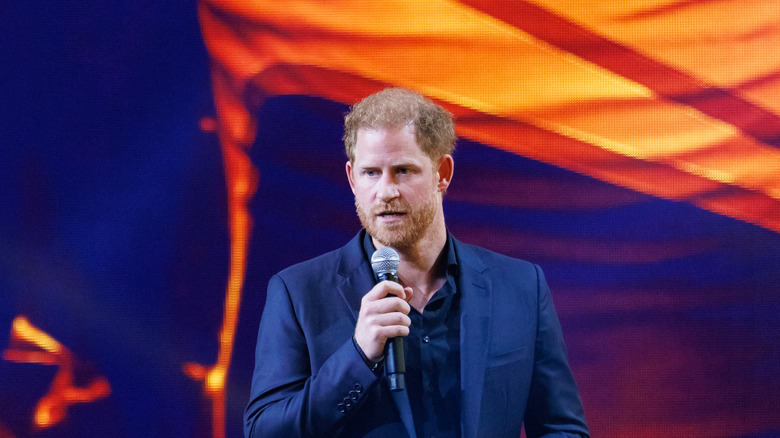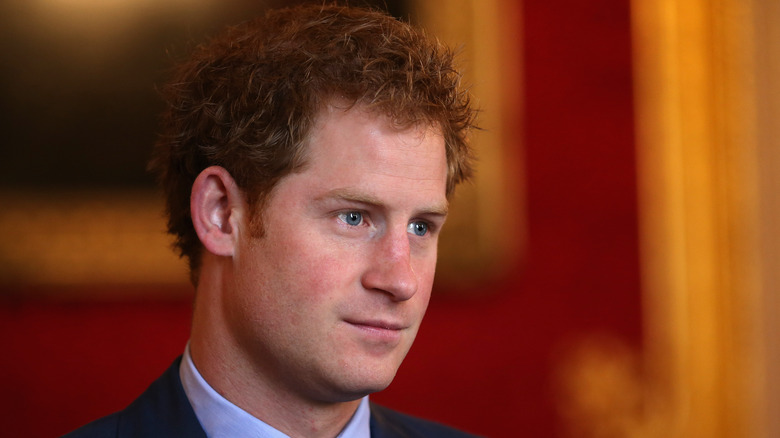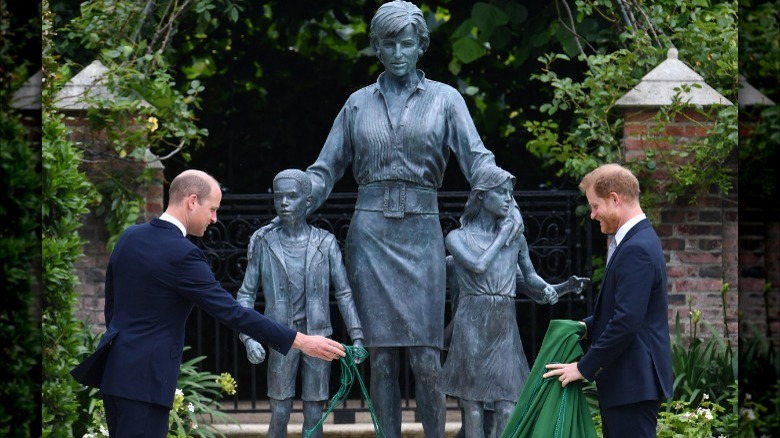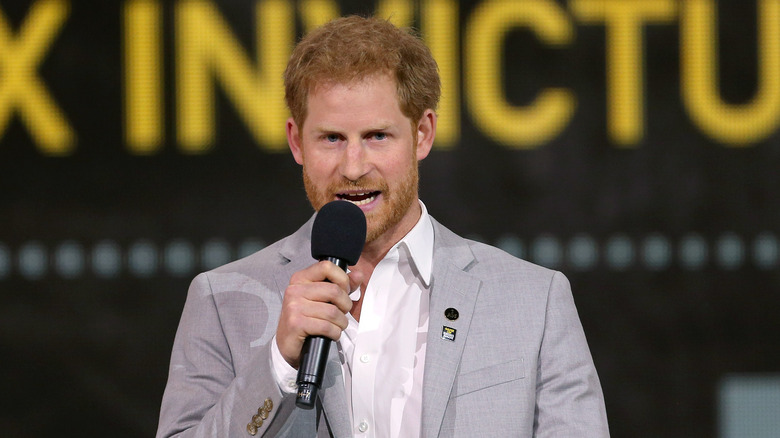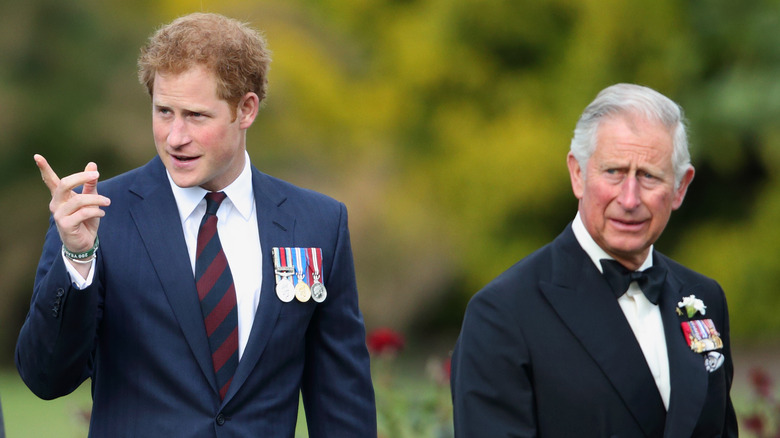Prince Harry's Trauma Responses To Princess Diana's Death Are Truly Sad
The following article mentions mental health struggles.
Princess Diana's sudden death in a car crash in 1997 stunned the world. It was the last thing anyone expected to happen to the youthful, vibrant princess, who was only 36 at the time and seemed to have a lifetime of adventures in front of her. And despite the very public deterioration of her marriage to King Charles III, she remained a deeply beloved figure not only among the British public, but among people around the world. Her heartbreaking death spurred a frenzy of media speculation and public mourning.
If Princess Diana's death left even casual royal watchers shell-shocked, its effects on those who loved and depended on her the most — her sons Prince William and Prince Harry, then only 15 and 12 respectively — were seismic and devastating. Not only did they lose their mother, with whom both were close, but they had to grapple with their loss in the public eye while coping with immense pressure to put on a good face for their subjects and the cameras. This difficult and lonely time was especially traumatic for Prince Harry, who still struggles to make sense of the tragic event and its impact on his adult life.
His father's distant manner when sharing Princess Diana's death shocked him
There's no easy way to tell a child that one of their parents has died. And while King Charles III no doubt did his best to perform this difficult task as gently as he could, while almost certainly still in deep disbelief himself, Prince Harry felt his delivery fell terribly short. "Twelve years old. Sort of — 7, 7:30 in the morning, early. Your father comes in, sits on your bed, puts his hand on your knee and tells you, 'There's been an accident.' I couldn't believe," he told Anderson Cooper in a 2023 episode of "60 Minutes." He recalled in his memoir, "Spare," "He says, 'They tried, darling boy. I'm afraid she didn't make it.' These phrases remain in my mind like darts on a board."
This was all confusing and harrowing enough — and obviously a lot to take in when you're still a child and barely awake or expecting a serious conversation. But what made it even worse for Prince Harry was his father's emotional distance as he shared the news. "Pa didn't hug me. He wasn't great at showing emotions under normal circumstances. But his hand did fall once more on my knee and he said, 'It's going to be okay.' But after that, nothing was okay for a long time," he wrote in "Spare."
He only cried once in the days following his mother's death
In movies, the revelation of bad news is typically followed by a torrent of tears. But for Prince Harry, the news of his mother's death was so sudden and unbelievable that his only reaction in the following days was emotional paralysis. "Never shed a single tear at that point," Harry said on "60 Minutes." "I was in shock, you know?" Princess Diana's death seemed so unreal to him that sometimes he preferred to believe it hadn't actually happened. In his memoir, "Spare," he shared that he often wondered if his late mother would one day return out of the blue. He even had a recurring dream about Diana reemerging without warning. "She was always wearing a disguise — a big blond wig. Or big black sunglasses," he wrote. "And yet I'd always recognize her."
It wasn't until his mother's burial at Althorp, her family's estate, that Prince Harry finally shed some tears. "Once my mother's coffin actually went into the ground, that was the first time that I actually cried," Harry recalled on "60 Minutes." "There was never another time."
As a child, he greeted his mother's mourners in a state of shock and guilt
For Prince Harry, participating in public mourning rituals in the days that followed his mother's death was an incredibly arduous task. So not only was he burdened with trying to cope with his own personal loss, he was required to interact with hundreds of strangers and support them in their grief as well. It was a lot to put on a 12-year-old, and while he looked outwardly graceful and composed during his public appearances, inside he was numb.
"It was like I was outside of my body and just walking along doing what was expected of me. [I was] showing one tenth of the emotion that everybody else was showing: This was my mum — you never even met her," he told Oprah Winfrey on their series, "The Me You Can't See" (via The Guardian). So profound was his shock and emotional paralysis that he felt nothing even as he shook hands with people who were openly crying. And this left him with a lasting sense of guilt. "Their hands were wet from wiping their own tears away. I do remember one of the strangest parts to it was taking flowers from people and then placing those flowers with the rest of them. As if I was some sort of middle person for their grief," he recalled on "60 Minutes."
He first tried to cope by shutting down his emotions
The numbness Prince Harry experienced in the immediate aftermath of Princess Diana's death was an understandable response to an unthinkable tragedy. But even as the immediate shock of her death receded, Prince Harry continued to cope by tamping down his emotions. This could have been motivated in part by overwhelm. Even though others in the royal family tried to talk to Prince Harry and his brother, Prince William, about their mother's death, he didn't yet have the maturity to grapple with or articulate his emotions. "Harry and I tried to talk as best we could about it," Prince William recalled in the 2017 HBO documentary "Diana, Our Mother: Her Life and Legacy" (via Town and Country). "But being so small at that age, it was very difficult to communicate or understand your feelings."
Another reason Prince Harry may have suppressed his grief was pressure from the royal family to keep a stiff upper lip and not let any personal trauma interfere with his official duties. "My father used to say to me when I was younger, he used to say to both William and I: 'Well it was like that for me so it's going to be like that for you'," Prince Harry told Oprah Winfrey on "The Me You Can't See." So rather than facing down his anger and sadness about his mother's death, he pushed it down. As he said on his Apple TV+ series, "I just decided not to talk about it."
Intense media attention after Princess Diana's death compounded his mental trauma
Compounding Prince Harry's stress following the death of his mother was the fact that media attention, always a fact of life for the royal family, only grew more intense as the family and world mourned. And Prince Harry now found himself squarely in the eyes of the media and even worse, expected to deal with it without complaint. As he recalled in his Apple TV+ show "The Me You Can't See," he was told that if he just buckled down and tried to "play the game," life would start to feel normal again.
It didn't. Even before his mother's death, Harry felt traumatized by invasive and unwanted media attention. As he recounted on "The Me You Can't See," paparazzi regularly tailed his mother's car — even when her young boys were riding in the backseat. He remembered wishing he could do something to stop this dangerous and aggressive behavior. Sadly, the paparazzi never relented and continued to chase the beloved princess. "That happened every single day until the day she died," the prince said.
And the fact that his mother's death was caused by her driver's attempt to evade yet more paparazzi only added to the troubling impact of these memories — and to his hatred of the press. "In Harry's mind, it was the press that killed his mother. I know that because he's told me that several times privately," Duncan Larcombe, former royals editor for The Sun, told Town and Country.
He drove through the tunnel where his mother died in search of closure
As Prince Harry grew older, he realized his lifelong strategy of avoiding any thoughts about his mother's death was only adding to his mental stress. He decided it was time to confront the reality of her death head on, and by doing so, perhaps find some closure to a "decade of unrelenting pain," as recalled in his memoir, "Spare."
So in 2007, while he was in Paris to watch the Rugby World Cup semifinals, he made a surprising request of his driver: to not only drive through the tunnel in which his mother died, but to do so at the same speed — 65 miles per hour — at which the fatal accident was reported to have happened. The quick trip through the tunnel proved anticlimactic. "We zipped ahead, went over the lip at the tunnel's entrance, the bump that supposedly sent Mummy's Mercedes veering off course. But the lip was nothing. We barely felt it," he wrote in "Spare." They drove through the tunnel a second time, but once again, nothing clicked. If anything, it only made him feel worse. "It had been a very bad idea. I'd had plenty of bad ideas in my twenty-three years, but this one was uniquely ill-conceived," he recalled in the memoir.
Unresolved trauma from this youth drove him to use drugs and alcohol
For many years after losing his mother, Prince Harry intentionally suppressed any thoughts about her death — or even about his mother herself — because the idea of confronting his loss was just too painful. "Because if I think about her, then it's going to bring up the fact that I can't bring her back," he told Oprah Winfrey on their Apple TV+ series "The Me You Can't See." Instead, he stuck to the royal family's tradition of dignified stoicism and tried to carry on as if nothing was amiss.
But the prince could only keep up the act for so long. By his late 20s, he was at a breaking point, and started experiencing panic attacks. "Every time I put a suit on and tie on ... having to do the role, and go, 'right, game face', look in the mirror and say, 'let's go'. Before I even left the house I was pouring with sweat. I was in fight or flight mode," he said on "The Me You Can't See." He eventually turned to drugs and alcohol. "[N]ot because I was enjoying it but because I was trying to mask something," Harry explained. "I was willing to try and do the things that made me feel less like I was feeling."
Unable to find solace from his father, Prince Harry turned to therapy
When children suffer through traumatic events, the first ones they turn to for comfort and support are usually their parents. But for Prince Harry, the death of Princess Diana meant not only the loss of his mother — by far the more emotionally expressive and openly affectionate of his parents — but suffering through the aftermath with relatively little emotional support from his father, the future King Charles III, nor from many other members of the royal household. "I wasn't in an environment where I was encouraged to talk about it," he told Oprah Winfrey on "The Me You Can't See."
Harry struggled in silence throughout his youth. By the time he was in his 20s, his brother, Prince William, suggested he reach out to professionals for help. "I saw GPs, I saw doctors, I saw therapists, I saw all sorts of people," he told Winfrey. Early on in his relationship with Meghan Markle, he dove even further into his mental health journey. "I knew that if I didn't do the therapy and fix myself that I was going to lose this woman who I could see myself spending the rest of my life with,' he told Winfrey. Harry has not only been open about seeking therapy, but even allowed one of his therapy sessions to be taped for "The Me You Can't See."
Their shared trauma inspired Princes Harry and William to launch a mental health charity
While their relationship has fractured in recent years, Prince Harry and his older brother, Prince William, were close during their youth. And their shared experience of losing their mother while being obliged to keep up a dignified appearance in the public eye cemented a unique bond between them. But perhaps because of a difference in emotional temperament, or maybe because he was older when the tragedy occurred, Prince William was better able to endure their shared trauma. "Slowly, you try and rebuild your life, and you try and understand what's happened, and I kept saying to myself that, you know, my mother would not want me to be upset," he said in the 2017 documentary "Diana, Our Mother: Her Life and Legacy."
Still, the death of their mother was difficult and traumatic for both brothers. It also made them both aware of the importance of mental health and of processing their emotions. This inspired the brothers, along with Catherine, Princess of Wales, to co-found a charity, Heads Together, to promote mental health awareness. "What's happened with us, and I think must happen with others as well, is that you have to prioritize your mental health," Prince William said in a video for the charity, as reported by Newsweek. "It's very easy to run away from it, you know, to walk away from it and avoid it. Someone has to take the lead and be brave enough to force that conversation."
His years of trauma made him realize the importance of emotional honesty
For most of the 20th century, the unofficial guiding principle for royal conduct was "never complain, never explain." This meant keeping up dignified appearances at all times, ignoring the haters, and keeping the rest of the public at a polite distance. And, of course, it meant never airing the family's dirty laundry. Indeed, until fairly recently, it was considered unthinkable for royals to reveal much about their private lives at all. "Above all things our royalty is to be reverenced, and if you begin to poke about it you cannot reverence it. ... Its mystery is its life. We must not let in daylight upon magic," author William Bagehot wrote in his 1867 work "The English Constitution."
But when Princess Diana married into the royal family in 1981, she found life to be anything but magic. And she was determined to live a more emotionally honest and open life than royals before her, granting several frank interviews in the '90s about her personal journey and experiences. And after spending his childhood and young adulthood struggling in silence, Prince Harry decided to follow in his mother's footsteps. He not only shared his own mental health challenges, but now encourages others to face their own honestly and openly. "The experience I have had is that once you start talking about it, you realize that actually you're part of quite a big club," he told The Telegraph in 2017.
Royal watchers believe Prince Harry 'blamed his father' for his trauma
If something unthinkably terrible happens within a family, most parents automatically do whatever they can to protect their children from the worst of it. They may reveal only the information they feel their children are old enough to understand and cope with, while shielding them from the rest. This was exactly what King Charles III tried to do after the sudden death of Princess Diana. He told Prince Harry, then only 12, that his mother had died in an accident and reassured him everything would be all right. But he refused to share or discuss any other details with Prince Harry or his brother.
"No newspapers no television and sadly very little discussion about their late mother. Charles thought that was the right thing to do," royal expert Ingrid Seward told the Irish Mirror. But in Harry's mind, this was anything but the right call — instead, Seward said, Harry felt it only laid the groundwork for years of pent-up anger and mental distress. "He blamed his father. He felt that Charles should have explained to both he and William exactly how and why the accident had occurred," Seward said. "Years passed and Harry complained he still didn't understand if his mother had been the victim of an assassination attempt or if it was just a tragic accident."
If you or someone you know needs help with mental health, please contact the Crisis Text Line by texting HOME to 741741, call the National Alliance on Mental Illness helpline at 1-800-950-NAMI (6264), or visit the National Institute of Mental Health website.
